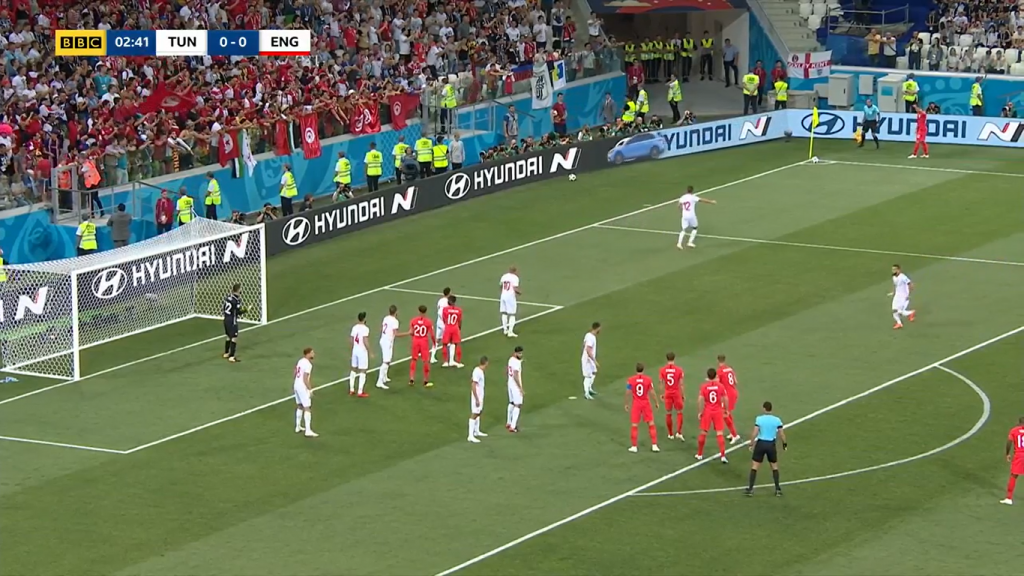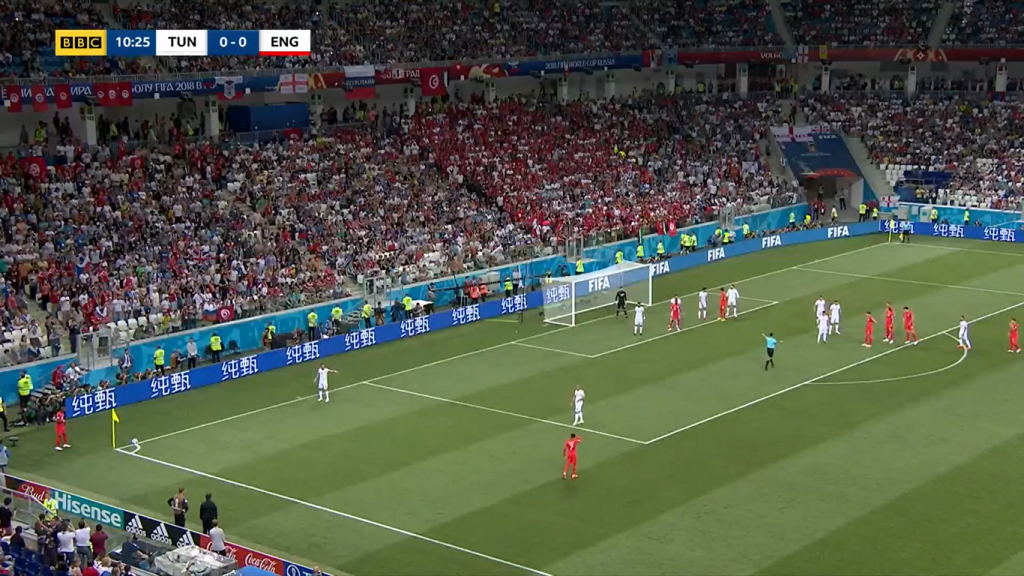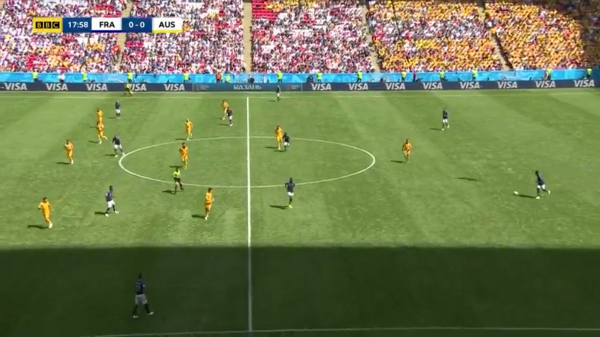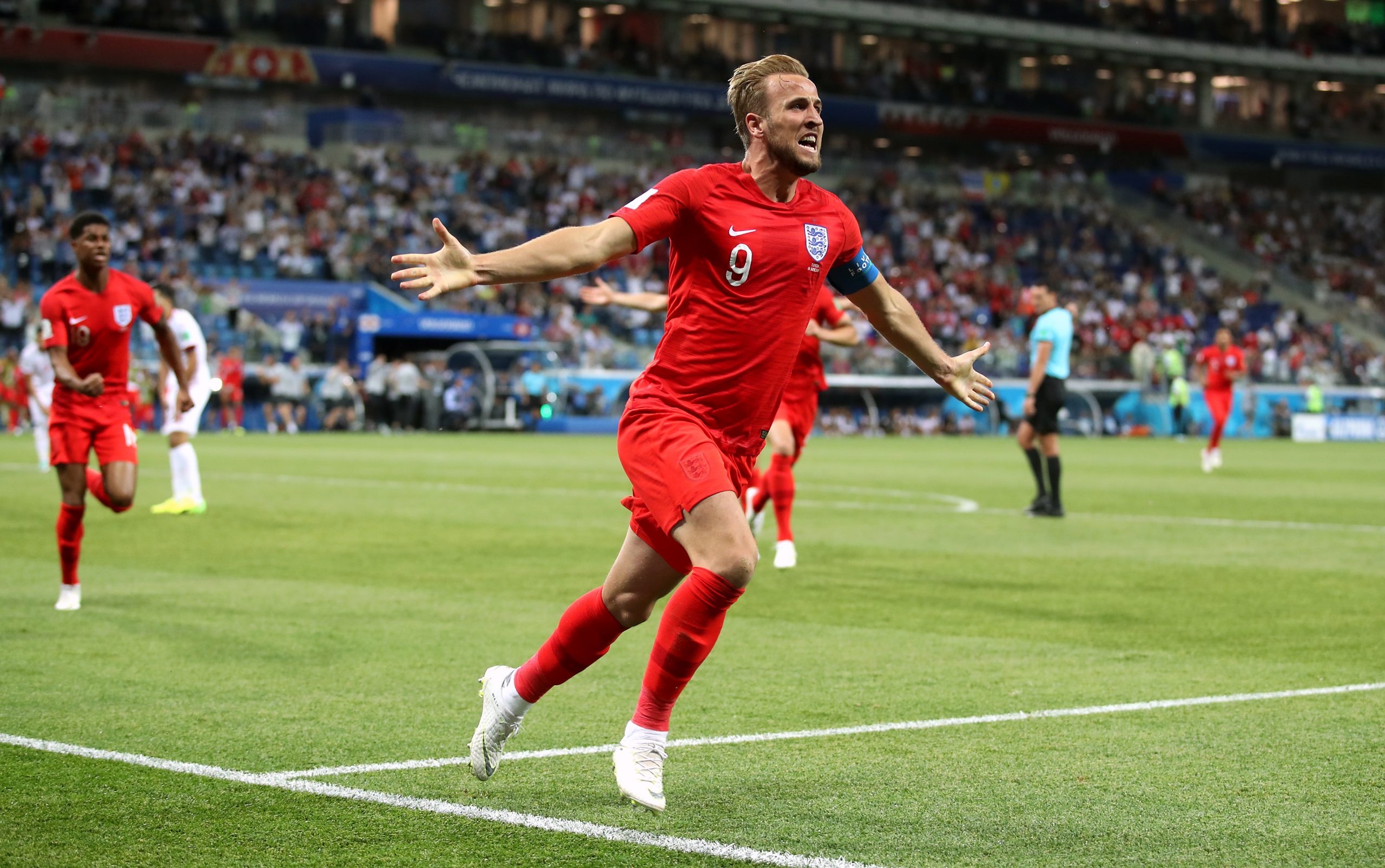The World Cup is here, and with that comes those glorious couple of weeks to kick off the tournament where each matchday consists of three to four group stage matches. We’ve already had the defending champs lose their first match, the implementation of VAR, Russia putting up five in the tournament opener, a Cristiano Ronaldo hat-trick, and other delectable goodness from the first five days. Despite only having an average of 2.29 goals per match so far, the 2018 iteration hasn’t been uneventful in the least, so let’s dive into some of what's already gone on in Russia.
England's Corner Kick Routines
England were very good for large parts of the first half against Tunisia and on the whole deserved their 2-1 victory. What was interesting to see in particular was just how much mileage they were getting off of their set piece routines. Over 72% of their 18 shots came from dead ball situations. With the lack of time available for international sides to create the level of sophistication from open play that we see during the domestic football season, one of the best ways to get ahead of the game in international football is dedicating time to developing set piece routines. It seemed clear that Gareth Southgate went over specific corner kick movements which paid huge dividends.
Tunisia started with something resembling a zonal marking approach to defend England's corners, which left England with a four against three opportunity at the top of the 18 yard area. As soon as the corner is delivered, three of the England players, Harry Kane, John Stones, and Jordan Henderson, would sprint in different directions and attract one of the three Tunisia players defending that space. That would leave one of the England players with enough room to rise up and create a headed chance, which was how they engineered their first goal.


http://gfycat.com/GorgeousAmusingHen
Tunisia changed things up in the second half, matching England's four up top with four of their own. While this did lead to less wide open headed attempts, you still saw the likes of Deli Alli and Harry McGuire muscle their way and create a few half-chances. England's second goal was also from a corner kick routine. and was quite a nice counter to Tunisia man marking the top of the penalty box. Kane was able to peel off his marker and find himself wide open in the six yard area, prime real estate for a high quality chance if someone could win the first header, which McGuire did.
http://gfycat.com/ImmediateAdoredDrongo
If England proved anything in their victory over Tunisia, dedicating real time towards set pieces works.
Goncalo Guedes Role as Second Striker
In Portugal’s final tune up match vs Algeria, Goncalo Guedes played as a second striker, a departure from the inverted winger role he was used in at Valencia. It worked to great effect, so much so that his two goals and general ability to create chaos with his speed were enough for him to supplant Andre Silva for the starting spot alongside Cristiano Ronaldo.
Guedes didn’t achieve those same heights against Spain, which is understandable on some level. Going from Algeria to Spain is like going from Glass Joe to Mike Tyson in Mike Tyson’s Punch-Out. He was used as an outlet for counter attacks as Spain weren’t able to counter-press nearly as aggressive as they've been renowned for after losing possession. In one sense, Guedes did his job successfully, with his first touch and subsequent assist for Ronaldo’s second goal being the highlight of his 80 minutes of action. But, he was largely uninspiring on the whole and you couldn’t help but wonder what might’ve been for Portugal had he not had the yips during some of Portugal's promising fast breaks.
http://gfycat.com/gifs/detail/tensefearlesscurassow
Defensively, it was clear that Guedes was following Ronaldo in Portugal’s 4–4–2 medium block, allowing Sergio Busquets and the Spanish CBs to create 3v2s during buildup play, instead just trying to deny passes into the central areas. This worked fine until Spain shifted into their left sided focus attack which bypassed the central areas and targeted the left half-space in Portugal's own third, to near devastating effects. It'll be interesting to see if Guedes gets another shot at playing that central position or will Fernando Santos instead turn to Andre Silva.
France’s Attacking Struggles
Didier Deschamps hasn’t been immune to criticism with his role as manager of the French national team, especially with the talent boom that’s gone on within French football over the past World Cup cycle. His job is to get the most out of what might be the most talented squad at the World Cup. He has the football equivalent of a Ferrari and has the responsibility of not screwing it up. Meek performances like ones against Australia won’t quiet down the masses who are convinced that Deschamps isn’t good enough to lead France to glory.
France were largely fine for the first 20 minutes or so, highlighted by the half chance from Kylian Mbappe less than two minutes in. Mbappe functioned as the central attacker of the three up front and was finding openings in Australia’s back-line to run into, just without that home-run pass from one of his teammates to really create those top level chances. The main tactical feature of France during buildup is that whenever they play Mbappe along with Ousmane Dembele and Antoine Griezmann, they’re pretty close together and the fullbacks are pushed higher up to provide width while also at times function as an outlet for switches of play.

As the first half wore on, things got worse. France became extremely static during possession. There were less and less dynamic runs being made from the likes of Paul Pogba and Corentin Tolisso. Fullback Benjamin Pavard was being used as an outlet to switch up play but he wasn't interested in trying to take on his individual marker in 1v1s and just recycled possession. France were just slow, compounded by the fact that they weren't even all that interested in trying to create transition opportunities or even applying loads of pressure on Australia's backline when they were circulating the ball during buildup play.
The second half wasn't anymore inspiring, with only moments of individual brilliance from Pogba and a shaky penalty call given by VAR saving France from dropping points against Australia. It's concerning that France picked what was about as close to a maximum fun lineup as possible, and their overall performance was the furthest thing from fun. If not for Germany, this would've been the most disappointing performance from a big nation so far.
Mexico’s Blistering Counter Attacks
You’ll be hard pressed this entire tournament to find a better display of counter attacking football than what Mexico did to Germany, including the splendid goal by burgeoning star Hirving Lozano. Some of this was undoubtedly helped by the fact that Germany played a double pivot of Ton Kroos and Sami Khedira: midfielders that for all their gifts on the ball aren’t exactly blessed with the mobility needed to cover ground defensively.
Germany faced similar problems to Spain, but on a grander scale. Because of the lack of mobility in their midfield along with Khedira’s penchant for migrating forward even when deployed as a #6, it left giant acres of space for Mexico to run into. Joshua Kimmich was bombing up and down the pitch, but that left the entirety of his side unoccupied for Lozano to gather the ball or even just run unopposed, and Kimmich is not fast enough to catch someone like Lozano when spotting him 10 to 15 yards. Combine all of that with a lack of aggression in winning the ball back in higher areas and Mexico having a number of players who are good and fast on the ball, and you get a match that descends into chaos. There were at least 5 instances in the first half alone where Mexico offered the promise of creating a high quality shot during fast break scenarios.
http://gfycat.com/OccasionalCheapClownanemonefish
Lozano was a key figure during these counter attacks, with his starting position usually around the left-half space at the beginning of these sequences, which helped a lot when he was on the ball and facing an unsettled Germany defense. One of his best features during his season at PSV was how much fear he inflicted on opponents with his combination of speed and awareness on how to time his runs off the ball. He would look at the opposing fullback, see when he’s on his blindside and time his run to get in goal for a shooting opportunity, which he did against Germany on multiple occasions.
If Mexico had any shot of finishing first in the group, they had to get something against Germany, and more likely beat them. They smartly pushed all their chips in with an athletic starting XI that tore Germany to bits by applying pressure on the Germans from their own half and immediately getting men forward for the first 45 or so minutes. Though that did slow down as the match progressed, it was still good enough for a massive victory that completely changed the complexion of Group F.
